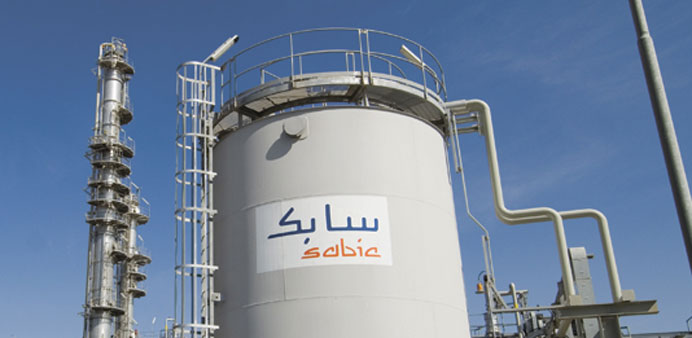Saudi Basic Industries Corp (Sabic) reported a dip in its quarterly earnings yesterday as its chief executive said a shortage of natural gas was limiting its domestic growth, making expansion abroad vital.
Sabic, the biggest listed company in the Gulf and one of the world's largest petrochemical firms, said net profit slipped 1.8% from a year earlier to 6.44bn riyals ($1.72bn) in the first quarter of 2014.
That was slightly below the average forecast of analysts polled by Reuters, who had predicted a quarterly profit of 6.79bn riyals.
Chief financial officer Mutlaq al-Morished said sales in the first quarter climbed to 49.5bn riyals from 46.8bn a year earlier. But Sabic said lower prices for some of its petrochemical products offset rises in output and sales volumes, while expenses related to sales and administration increased.
More broadly, Sabic chief executive Mohamed al-Mady complained that a lack of ample natural gas supplies within Saudi Arabia had emerged as a key constraint on growth there. Natural gas is used as a feedstock for petrochemical production.
"The shortage of gas and many sectors competing for it have made internal expansion very hard," Mady told a news conference.
Saudi Arabia bans imports of natural gas and its pricing structure for domestic supplies has reduced the financial incentive to explore for it.
Foreign companies formed ventures with state oil firm Saudi Aramco to look for gas deposits, but over the past decade they largely failed to find commercially viable deposits. Saudi authorities now want to focus the search on unconventional deposits - deep, high-temperature reservoirs that would require more complex and expensive technologies.
Mady noted that Sabic had several domestic petrochemical projects under construction, including a synthetic rubber plant at its Kemya joint venture that would come on line in two to three years.
But he said the company was looking at possible mega-projects in North America and China as avenues for growth, including potential projects involving shale gas in North America.
"We are talking with a number of potential partners in the US for investment in shale gas," he added without giving a specific time frame for any deals. "The cost of shale gas is reasonable compared to oil or alternative materials like coal or solar power."
He added, "Sabic cannot keep relying on one market — China will continue to be a strong market but we have to find new markets...We have South America, it is growing tremendously and we have plans to examine our presence in South America." Africa could become an attractive new market because of its gas supplies, he said.
Mady said the business environment faced by Sabic this year would be similar to 2013, with China's economy growing steadily and Europe stagnant or growing at a rate of about 1%. "So if this continues we will probably see 2014 similar to 2013."
Khodari
Major Saudi Arabian construction firm Abdullah A M Al-Khodari Sons said yesterday that its net profit for the first quarter of this year jumped 78% on the back of earnings from an auction of plant and machinery.
Net profit rose to 32.63mn riyals ($8.7mn) from 18.28mn riyals a year earlier. The machinery auction brought in 41.3mn of income.
Operating profit plunged 96% to 1.02mn riyals, however, partly because of reforms to Saudi Arabia's labour market which have made it more expensive to hire foreign workers. Work permit costs to the company increased by 13.2mn riyals.
Profit was also hurt by an increase in depreciation costs as the company deployed equipment for newly awarded projects worth 1.5bn riyals, a 31% rise in manpower costs mainly due to a ramp-up of labour-intensive cleaning projects, and a 69% leap in financing charges as the company enlarged its funding base to meet its contract backlog.
Chief executive Fawwaz al-Khodari said in an interview earlier this month that he expected the labour reforms to keep weighing on the company's bottom line for a few more years, but the situation would start improving in the second half of 2014.
NBO
National Bank of Oman reported a 20% rise in first-quarter net profit yesterday, slightly above analyst estimates.
The bank made a profit of 10.3mn rials ($26.75mn) in the first three months of 2014, up from 8.6mn rials in the year-earlier period, according to a statement to Oman's bourse.
Analysts polled by Reuters on average forecast the bank would make a quarterly profit of 9.88mn rials.
Savola Group
Saudi Arabia's Savola Group posted a 43% rise in first-quarter profit yesterday, beating analysts' estimates as the food producer expanded its market share in the retail sector, revenue rose and financial charges fell.
The company made a profit of 423mn riyals ($112.8mn) in the first three months of 2014, up from 295mn riyals in the year-earlier period, according to a statement to Riyadh's bourse.
Analysts polled by Reuters on average had forecast Savola would make a quarterly profit of 323mn riyals.
The firm, a producer of cooking oil, sugar and other foodstuffs, attributed its higher net profit to growth in revenue, increased market share in the retail sector, lower finance charges and larger profits from an affiliate. It did not provide further details.
Savola expects its second-quarter net income before any capital gains to be 410mn riyals, chief executive Abdulraouf Mannaa said in the statement.

